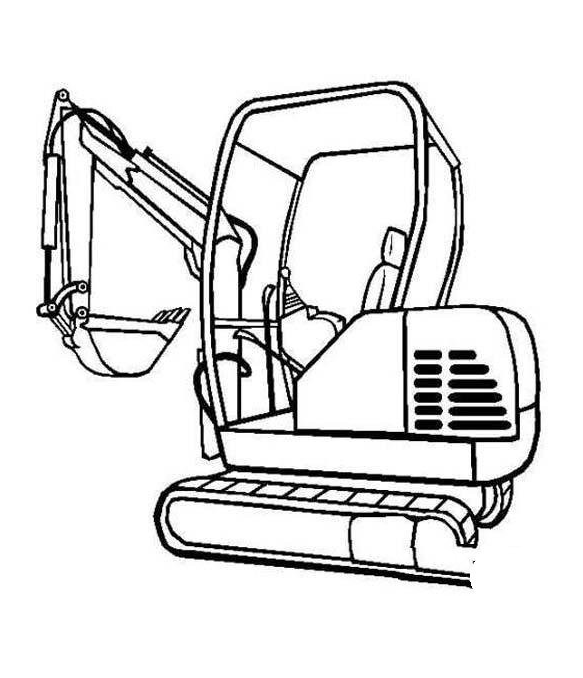The cost of general construction machinery and equipment is very high, so we need to take good care of the construction machinery and extend its lifespan.
In addition to minimizing the impact of harmful factors, normal working loads should also be ensured when using construction machinery. Below, the editor will provide you with a detailed introduction:
1. Ensure normal working load
The size and nature of the working load of construction machinery have a significant impact on the mechanical loss process. Generally speaking, the wear of parts increases proportionally with the increase of load. When the load borne by the component is higher than the average design load, its wear will intensify. In addition, under the same other conditions, stable load has less wear, fewer faults, and lower lifespan compared to dynamic load. Experiments have shown that when the engine operates under unstable load compared to stable load, the wear of its cylinder will increase by two times. Engines operating under normal load have a lower failure rate and longer lifespan. On the contrary, overloaded engines have a significant increase in fault occurrence and a decrease in lifespan compared to design specifications. Machinery that is frequently subjected to large-scale load changes has a greater wear and tear than machinery that operates continuously and stably
2. Reduce various corrosive effects
The phenomenon of metal surface being damaged by chemical or electrochemical interactions with surrounding media is called corrosion. This corrosive effect not only affects the normal operation of the external equipment of the machinery, but also corrodes the internal components of the machinery. Chemicals such as rainwater and air enter the interior of machinery through external channels and gaps, corroding the interior of mechanical components, accelerating mechanical wear, and increasing mechanical failures. Due to the fact that this corrosive effect is sometimes invisible or untouchable, it is easily overlooked and therefore more harmful. During use, management and operators should take effective measures based on the local weather conditions and air pollution at the time to reduce the impact of chemical corrosion on the machinery, with a focus on preventing the intrusion of rainwater and chemical components in the air into the machinery, and minimizing operations in the rain as much as possible.
3. Reduce the impact of mechanical impurities
Mechanical impurities generally refer to non-metallic substances such as dust and soil, as well as some metal chips and wear products generated by engineering machinery during use. Once these impurities enter the interior of the machine and reach between the mating surfaces of the machine, their harm is significant. They not only hinder relative movement and accelerate the wear of the parts, but also scratch the mating surface, damage the lubricating oil film, and cause the temperature of the parts to rise, leading to the deterioration of the lubricating oil.
It is measured that when the mechanical impurities in lubrication increase to 0.15%, the wear rate of the first piston ring of the engine will be 2.5 times higher than the normal value; When the rolling shaft enters impurities, its lifespan will decrease by 80% -90%. Therefore, for construction machinery working in harsh and complex environments, it is necessary to use high-quality and matching components, lubricants, and greases to block the source of harmful impurities; Secondly, it is necessary to do a good job in mechanical protection at the work site to ensure that the corresponding mechanisms can work normally and prevent various impurities from entering the interior of the machinery. For machinery that has malfunctioned, try to go to a formal repair site for repair. During on-site repairs, protective measures should also be taken to prevent the replaced parts from being contaminated by impurities such as dust before entering the machinery.
4. Reduce the impact of temperature
In work, the temperature of each component has its own normal range. For example, the temperature of cooling water is generally 80-90 ℃, and the temperature of hydraulic oil in hydraulic transmission systems is 30-60 ℃. If it falls below or exceeds this range, it will accelerate the wear of parts, cause lubricant deterioration, and cause changes in material properties.
Experiments have shown that the wear of the main transmission gears and bearings of various construction machinery increases by 10-12 times when operating in -5 ℃ lubricating oil compared to operating in 3 ℃ lubricating oil. But when the temperature is too high, it will accelerate the deterioration of the lubricating oil. For example, when the oil temperature exceeds 55-60 ℃, the oxidation rate of the oil will double for every 5 ℃ increase in oil temperature. Therefore, during the use of construction machinery, it is necessary to prevent overload operation at low temperatures, ensure normal operation during the low-speed preheating stage, and allow the machinery to reach the specified temperature before driving or working. Do not neglect its important role because there are no problems at that time; Secondly, it is necessary to prevent the machinery from operating at high temperatures. During the operation of the machinery, it is necessary to frequently check the values on various temperature gauges. If any problems are found, the machine should be immediately shut down for inspection and any faults should be promptly resolved. For those who cannot find the cause at the moment, they must not continue to work without treatment. In daily work, pay attention to checking the working condition of the cooling system. For water-cooled machinery, it is necessary to inspect and add cooling water before daily work; For air-cooled machinery, it is also necessary to regularly clean the dust on the air-cooled system to ensure smooth heat dissipation ducts.
Post time: Apr-28-2023

